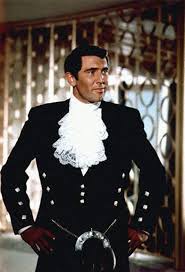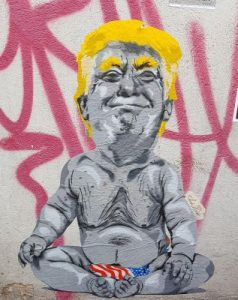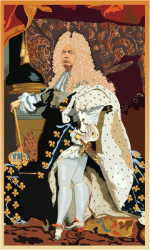
© Jonathan Cape
Today, I’ve learned, is James Bond Day – even though it’s a bit hard to celebrate the occasion when (1) the franchise now belongs to Jeff Bezos, who, with his vast fortune, private space programme and bald head, would make a good Bond villain, and (2) we currently have no idea who the next James Bond will be.
However, to celebrate the occasion, here is the first half of a lengthy treatise I’ve written about On Her Majesty’s Secret Service: both the 1963 novel by Ian Fleming, which I think is possibly the best of the books, and the 1969 movie, which I think is definitely the best of the films. For simplicity’s sake, I’ll abbreviate the title to OHMSS. Oh, and if you aren’t familiar with the storylines of the book and film, be warned that his entry will be chock-full of spoilers.
On Her Majesty’s Secret Service was the tenth of Ian Fleming’s Bond novels. He wrote it in early 1962 at Goldeneye, his estate in Jamaica. Nearby, meanwhile, Jamaican locations were being used for the filming of the very first James Bond film, Dr No. Thus, James Bond was undergoing a metamorphosis – from a literary phenomenon into something bigger, a franchise incorporating large-scale moviemaking and merchandising and whose central character would soon be an icon of 1960s pop culture. Though the novels were refined examples of pulp fiction, Fleming – who was methodical about his research – at least tried to give them a veneer of believability. With each successive film, however, Bond seemed to drift further from the realm of possibility and into that of outright fantasy.
OHMSS-the-novel feels different from its literary predecessors, but not because Fleming tries to take it in the direction the films were going. He does the opposite. It makes Bond more believable as a character, not less. It’s ostensibly about the first face-to-face encounter between Bond and his archenemy Ernst Stavros Blofeld, who is head of the secretive and deadly crime syndicate SPECTRE. But OHMSS also explores Bond’s emotional side and highlights his vulnerability.
Key to this is OHMSS’s sub-plot about the romance between Bond and Contessa Theresa ‘Tracy’ di Vicenzo, a woman whose father, Marc-Ange Draco, runs a crime syndicate too, the Unione Corse of Corsica. At the novel’s end, with Blofeld seemingly vanquished, Bond and Tracy get married – only for Blofeld to suddenly reappear in the final pages, spray their bridal car with bullets, kill Tracy and leave Bond as a babbling wreck. As a reviewer in the Times Literary Supplement noted at the time, this Bond was “somehow gentler, more sentimental, less dirty.”
When Cubby Broccoli and Harry Saltzman got around to filming OHMSS six years later, five Bond books had been turned into movies and, already, the continuities of the books and films were hopelessly at odds. In the books, Blofeld had made a ‘backstage’ appearance in OHMSS’s immediate predecessor, Thunderball. In OHMSS’s successor, You Only Live Twice, Bond and he have a second and final meeting. It’s the grim tale of the traumatised Bond hunting down and getting his revenge on Blofeld, much of it taking place on a bizarre ‘island of death’ off the Japanese mainland, whose deadly fauna and volcanic discharges attract a steady stream of visitors wanting to commit suicide.
In the Bond movie-world, though, Blofeld had featured in the backgrounds of From Russia with Love (1963) and Thunderball (1966) and then played a leading role in the film immediately before OHMSS, 1967’s You Only Live Twice – yes, the title that came after it in the book series. As a result, there isn’t much grimness in You Only Live Twice-the-movie. It’s a jolly science-fictional romp involving stolen spaceships, a secret base disguised as a Japanese volcano and Donald Pleasence playing Blofeld with a white jumpsuit, severe facial scar and fluffy white cat. The film is a cartoonish thing compared with the book because, as far as the films are concerned, the murder of Bond’s wife hasn’t happened yet.

© Eon Productions / United Artists
When OHMSS began filming, the filmmakers – Broccoli and Saltzman, scriptwriter Richard Maibaum and director Peter Hunt, who’d worked as a film editor and second-unit director on the previous five movies – made the brave decision to follow Fleming’s book closely, right up to the tragic denouement. So keen was Hunt to be faithful to the book that supposedly he carried a copy of it with him around the set, its pages marked with his own annotations.
At the start of OHMSS-the-book, it seems like business as usual for Bond. As with the previous novels, he’s a sophisticated, money-is-no-object consumer of the sort of food, drink, cigars, clothes and cars that most of Fleming’s post-war, austerity-Britain readers could only dream about. Although Fleming writes early on that “James Bond was not a gourmet. In England he lived on grilled soles, oeufs cocotte and cold roast beef with potato salad,” a page later we hear him bitching about the quality of a meal he’s just had in a French eatery, about “…the fly-walk of the Paté Maison (sent back for a new slice) and a Poularde à la crème that was the only genuine antique in the place. Bond had moodily washed down this sleazy provender with a bottle of instant Pouilly Fuissé and was finally insulted the next morning by a bill for the meal in excess of five pounds.”
However, the tone soon changes. Bond is in France at the tail end of a mission to locate Blofeld, an interminable and fruitless mission that’s pissed him off to the point where he’s ready to hand in his resignation to M. Then he crosses paths with the troubled but imperious Tracy. In a pricey hotel-cum-casino she commands him: “Take off those clothes. Make love to me. You are handsome and strong. I want to remember what it can be like. Do anything you like. And tell me what you like and what you would like from me. Be rough with me. Treat me like the lowest whore in creation. Forget everything else. No questions. Take me.”
Later, on the coast, Bond intervenes to prevent Tracy from committing suicide and the two of them fall into the clutches of some heavies who turn out to be working for Tracy’s father, Draco, godfather of the Unione Corse. Draco is delighted with Bond taking a protective interest in his daughter and urges him to marry her – offering a one-million-pound dowry as a sweetener. Bond declines the marriage offer but agrees to continue romancing Tracy, if it’ll help her mental state. He also manages to coax some information out of his would-be father-in-law regarding Blofeld’s whereabouts. The super-villain, it transpires, is hiding in Switzerland.
The same events occur in the film version, although in a different order. First, Bond saves Tracy from drowning herself, then he gets to know her intimately. Also, the action takes place not in France, but in Portugal – Peter Hunt felt that by this time cinemagoers were overly familiar with the French coast. Just before the credits kick in (and we get to hear John Barry’s instrumental OHMSS theme, regarded by many as the best Bond tune of the lot), there’s also some breaking of the fourth wall as Bond turns towards the camera and quips, “This never happened to the other fellow.” For yes, this movie features a brand new James Bond. Gone is the slurring Edinburgh brogue, hairy Caledonian brawn and insouciant Scottish scowl of Sean Connery – who by then, apparently, couldn’t even bring himself to exchange words with Cubby Broccoli – and in his place is the inexperienced Australian actor George Lazenby.
Actually, such a novice was Lazenby at the time that the only thing he was known for was appearing in a TV commercial for Fry’s Chocolate Cream. I’ve heard a story that Broccoli saw him a barber’s shop, liked the ‘cut of his jib’ and picked him on the spot. However, interviewed on the making-of documentary that accompanies my DVD copy of OHMSS, Lazenby claims that he already had an audition for Bond lined up. He went to that barber’s because he knew that Connery had used it in the past and he thought it was his best bet for getting a ‘Bondian’ haircut. The establishment was used by other people associated with the Bond movies and Broccoli happened to be there when Lazenby walked in.

© Eon Productions / United Artists
In contrast with the inexperienced Lazenby, the actress playing Tracy in the movie was already a star – Diana Rigg, who’d made a name for herself playing Emma Peel in the gloriously baroque 1960s TV show The Avengers (1961-69). Fascinatingly, for a film series that’s often accused of de-humanising the books and emphasising big, dumb spectacle at the expense of characterisation, Tracy is a more fleshed-out character in the film than in Fleming’s novel. She’s given more to do and, played by Rigg, she has a sparkle that’s missing in the rather aloof, ambiguous character that Fleming sketches. Tales about how Lazenby and Rigg didn’t get on during the shoot are legion – most notably about Rigg munching garlic prior to the filming of scenes where Bond and Tracy kiss. Director Hunt has disputed these claims, although I’ve seen at least one interview with Rigg where her comments about Lazenby are uncomplimentary.
Both the book and film show Bond getting an unexpected lead about where to find Blofeld in Switzerland – the College of Arms in London has had dealings with his adversary, who wants them to prove he is heir to the aristocratic title of ‘Compte Balthazar de Bleuchamp’. This allows Bond to adopt the guise of Sir Hilary Bray, a College of Arms genealogist, and travel to Blofeld’s hideout, a mysterious medical clinic perched on top of the Piz Gloria in the Swiss Alps, where he promises to do some research in support of Blofeld’s claim to the title.
In the novel Fleming devotes a lot of time to the College of Arms, whose work clearly interests him. It also allows him to explore the theme of snobbery. As Sable Basilisk, a genealogy expert interviewed by Bond, comments: “I’ve seen hundreds of smart people from the City, industry, politics – famous people I’ve been quite frightened to meet when they walked into the room. But when it comes to snobbery, to buying respectability so to speak, whether it’s the title they’re going to choose or just a coat of arms to hang over their fireplaces in Surbiton, they dwindle and dwindle in front of you… until they’re no more than homunculi.” It’s satisfying that Blofeld’s snobbery is the weakness that allows Bond to ensnare him. Mind you, some would say this is rich coming from Fleming. His Bond novels, with their suave, sophisticated, well-travelled and well-heeled hero, have often been accused of snobbery themselves.
It’s also during this stage of the book we learn about Bond’s family. For example, he’s informed by the College of Arms that his family motto – and coincidentally a title for a Pierce Brosnan Bond movie 30 year later – is ‘The world is not enough’, of which he says, “It is an excellent motto which I shall certainly adopt.” And we learn that his father was a Scotsman who “came from the Highlands, from near Glencoe” (a detail honoured by the 2012 Daniel Craig Bond movie Skyfall), while his mother was Swiss.
Not that Fleming is complimentary about his parents’ nationalities. Another genealogist, Griffin Or, says of the Scots in olden times: “In those days, I am forced to admit that our cousins across the border were little more than savages… Very pleasant savages, of course, very brave and all that… More useful with the sword than with the pen.” Of his mum’s homeland, meanwhile, Bond snorts, ”(m)oney is the religion of Switzerland.” M replies to this: “I don’t need a lecture on the qualities of the Swiss, thank you, 007. At least they keep their trains clean and cope with the beatnik problem…” (If M reckoned there was a problem with the beatniks, God knows how he felt in the late 1960s when the hippies appeared.)
Fleming gave Bond a partly Scottish parentage because, it’s said, he was impressed with the job Connery did of portraying his super-spy when filming of Dr No took place in Jamaica in 1962. Dr No-the-film’s influence is detectable elsewhere. In Blofeld’s Alpine base, which in the book is a ski resort as well as a clinic – in the film it’s only the latter – a character points out to Bond a certain lady among the fashionable skiers: “And that beautiful girl with the long fair hair at the big table, that is Ursula Andress, the film star.” Andress, of course, was Connery’s co-star in Dr No and has a place in cinematic history as the first major Bond girl.
To be continued…

© Eon Productions / United Artists




